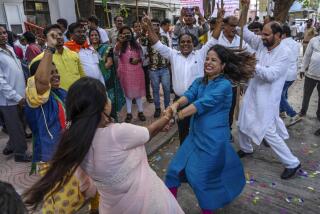Malaysia’s ruling coalition maintains parliamentary majority
PENANG, Malaysia — Malaysia’s ruling National Front coalition won at the polls Sunday, election commission officials announced, as voters opted for continuity and experience over opposition calls for reform.
The 13-party National Front secured 133 of 222 parliamentary seats, surpassing the 112 required for a simple majority. It was the coalition’s 13th consecutive general election victory since the country gained independence from Britain in 1957.
Prime Minister Najib Razak, 59, head of the majority United Malays National Organization party, led the ruling coalition to victory, hammering home the message to his largely rural conservative Muslim Malay base that the inexperienced opposition would ruin the economy and erode national security.
The country’s population is about 60% ethnic Malay Muslim, 25% ethnic Chinese and 15% ethnic Indians and other minorities.
Reflecting the stakes, voter turnout was about 80%, the highest ever for a Malaysian election. Sunday’s vote saw 2.6 million young Malaysians vote for the first time, a potentially decisive bloc that both sides courted using social media and other online tools.
Daniel Wa, 24, the ruling coalition’s youngest candidate, spent the final hours before polls opened shaking hands and waving to well-wishers in Kampar, a town of 70,000 people in the west coast state of Perak, the heart of a former tin-mining region. Wa acknowledged that the opposition message appealed to many younger voters. “But we have had an impact when campaigning,” he added. “They see that there are new faces on our side too.”
The opposition coalition, led by former Deputy Prime Minister Anwar Ibrahim, 65, appealed to ethnic minorities and better-educated city dwellers with a pledge to clean up politics and end race-based affirmative action. Younger Malaysians, in particularly, have bridled under a legacy of alleged nepotism, insider political deals and corruption scandals.
“It is time for change,” said Lee Chin Hoi, 42, a teacher, who said he favored the opposition, standing in front of a polling station located in a Rotary Club hall in Penang’s Georgetown area. he said. “Maybe the [opposition] can clean up some of the corruption in this country.”
Ultimately, analysts said, the National Front’s economic legacy won the day. The ruling coalition has delivered economic growth averaging more than 5% a year for decades while pursuing a goal of turning Malaysia into an industrialized nation by 2020.
“In the end, people have to have an economic reason to move against the government,” said Azmi Sharom, a law professor at Kuala Lumpur’s University of Malaya. “Things are not that bad, even though the rich-poor gap is serious.”
Although the loss could end Anwar’s political career, analysts said, the opposition’s strong showing is a shot across the bow for a government that’s been slipping in the polls. In 2008, it lost its two-thirds majority for the first time, blunting its ability to pass legislation and enact constitutional changes.
“This win tells us people opted for security,” said Norani Othman, a sociology professor at the National University of Malaysia. “But they’re also letting the incumbent government know it’s time for real change, not more rhetoric, on issues like religious freedom, religious tolerance.”
Others were skeptical the government would heed the wake-up call. “I don’t think they will reform,” said Sharom. “They’ve already had enough opportunities over the past five years. The 2008 election gave them a real shock, but they only made cosmetic changes.”
Also benefiting the ruling party, analysts said, was the disproportionate role in Malaysia’s parliamentary system of rural voters -- a demographic stronghold for the government -- as well as the so-called first-past-the-post system of counting votes that can magnify the impact of even a narrow victory. In fact, the opposition won the popular vote although not the seat count.
The two-week campaign was tarnished by allegations of vote rigging and related abuses, including an opposition charge that the government flew at least 40,500 people on chartered flights from the Borneo states of Sabah and Sarawak to parts of the peninsular mainland to boost the government’s chances of winning. “These irregularities have cost us many seats, particularly those with narrow margins,” Anwar said at a news conference early Monday morning.
The ruling coalition acknowledged arranging some flights but said it was part of a normal voter turnout drive.
In online comments Sunday, Internet users spoke of how easy it was to wash off supposedly indelible ink from index fingers designed to guard against repeat voting.
“This election is dirty,” said Chow Beng San, an ethnic Chinese businessman from Alor Setar, the regional capital of northern Kedah state, as he extended his finger, scoffing at the quality of the ink. “There are stories of the foreigner getting ID cards and voting.”
Allegations of irregularities could undercut confidence in the government win and lead to street protests, some analysts said. Police banned in advance all victory parades and street demonstrations after the outcome was announced.
“The results are not really the way voters felt,” said Bridget Welsh, a political science professor at Singapore Management University. “It’s cheating, so that’s a victory for the opposition.”
[Updated, 10:25 p.m. May 5: This post has been updated to show that the government won 133 seats, surpassing the 112 required for a simple majority.]
ALSO:
Israel’s likely targets in Syria: Iran and Hezbollah
Body of third American found at site of Kyrgyzstan crash
Richard Nixon’s grandson tours China to recall historic 1972 visit
Special correspondent Roughneen reported from Kedah, Penang and Perak states in Malaysia. Times staff writer Magnier reported from Kolkata, India.
Mark.Magnier@latimes.com
More to Read
Sign up for Essential California
The most important California stories and recommendations in your inbox every morning.
You may occasionally receive promotional content from the Los Angeles Times.










